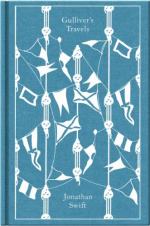[Illustration: “THE MOST VIOLENT EXERCISE I EVER UNDERWENT.” P. 71.]
I began my discourse by informing his majesty that our dominions consisted of two islands, which composed three mighty kingdoms, under one sovereign, besides our plantations in America. I dwelt long upon the fertility of our soil and the temperature of our climate. I then spoke at large upon the constitution of an English parliament, partly made up of an illustrious body, called the House of Peers, persons of the noblest blood and of the most ancient and ample patrimonies. I described that extraordinary care always taken of their education in arts and arms, to qualify them for being counsellors both to the king and kingdom; to have a share in the legislature; to be members of the highest court of judicature, from whence there could be no appeal; and to be champions always ready for the defence of their prince and country, by their valor, conduct, and fidelity. That these were the ornament and bulwark of the kingdom, worthy followers of their most renowned ancestors, whose honor had been the reward of their virtue, from which their posterity were never once known to degenerate. To these were joined several holy persons, as part of that assembly, under the title of bishops, whose peculiar business it is to take care of religion, and those who instruct the people therein. These were searched and sought out through the whole nation, by the prince and his wisest counsellors, among such of the priesthood as were most deservedly distinguished by the sanctity of their lives and the depth of their erudition, who were indeed the spiritual fathers of the clergy and the people.
That the other part of the parliament consisted of an assembly, called the House of Commons, who were all principal gentlemen, freely picked and culled out by the people themselves, for their great abilities and love of their country, to represent the wisdom of the whole nation. And that these two bodies made up the most august assembly in Europe, to whom, in conjunction with the prince, the whole legislature is committed.
I then descended to the courts of justice, over which the judges, those venerable sages and interpreters of the law, presided, for determining the disputed rights and properties of men, as well as for the punishment of vice and protection of innocence. I mentioned the prudent management of our treasury, the valor and achievements of our forces by sea and land. I computed the number of our people, by reckoning how many millions there might be of each religious sect or political party among us. I did not omit even our sports and pastimes, or any other particular, which I thought might redound to the honor of my country. And I finished all with a brief historical account of affairs and events in England for about a hundred years past.
This conversation was not ended under five audiences, each of several hours; and the king heard the whole with great attention, frequently taking notes of what I spoke, as well as memorandums of what questions he intended to ask me.




